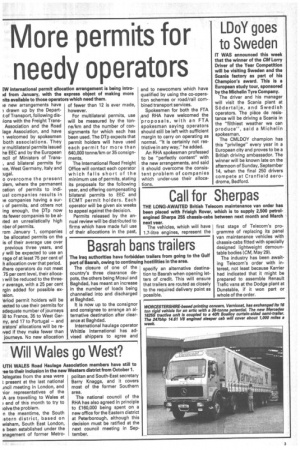More permits for needy operators
Page 3

If you've noticed an error in this article please click here to report it so we can fix it.
EW international permit allocation arrangement is being id from January, with the express object of making nits available to those operators which need them. intromore le new arrangements have drawn up by the Departit of Transport, following dis,ions with the Freight TransAssociation and the Road lage Association, and have welcomed by spokesmen both associations. They ,r multilateral permits issued he EEC and by the European ncil of Ministers of Trans, and bilateral permits for ice, West Germany, Italy and ugal.
o overcome the present )lem, where the permanent cation of permits to indiual companies results in le companies having a sur; of permits, and others not ing enough, the pTp now its fewer companie to be alited an unrealistically high Iber of permits.
-om January 1, companies be allocated permits on the is of their average use over previous three years, and v will be expected to use an rage of at least 75 per cent of h allocation over that period. There operators do not meet 75 per cent level, their allocaI will be reduced to the three 1r average, with a 25 per cent rgin added for possible ex tsion.
leriod permit holders will be rected to use their permits for adequate number of journeys 50 to France, 35 to West Gerny, and 17 to Portugal — and 3rators' allocations will be reved if they make fewer than journeys. No new allocation
of fewer than 12 is ever however.
For multilateral permits, use will be measured by the tonne/km and the number of consignments for which each has been used. The DTp expects that permit holders will have used each permit for more than 640,000 tonne/km or 35 consignments.
The International Road Freight Office will contact each operator which falls short of the minimum use of permits, stating its proposals for the following year, and offering compensating bilateral permits to EEC and ECMT permit holders. Each operator will be given six weeks to appeal against the decision.
Permits released by the annual review will be distributed to firms which have made full use of their allocations in the past, made, and to newcomers which have qualified by using the co-operation schemes or road/rail cornbined transport services.
Spokesmen for both the FTA and RHA have welcomed the proposals, with an FTA spokesman saying operators should still be left with sufficient margin to carry on operating as normal. "It is certainly not restrictive in any way," he added.
An RHA spokesman professed to be "perfectly content" with the new arrangements, and said it should overcome the consistent problem of companies which under-use their allocations.














































